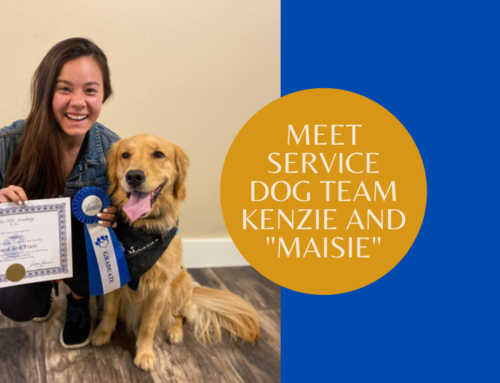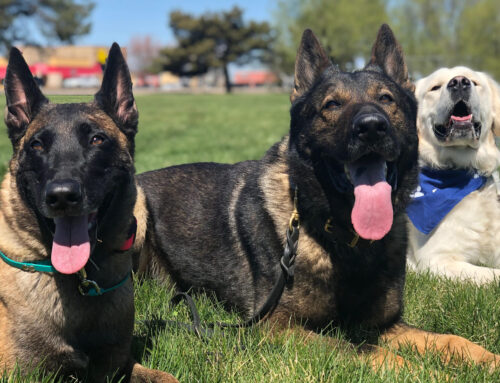There is an unfortunate lack of understanding among the general public – and even educated dog owners – when it comes to assistance dogs. A few well-known assistance dogs are “Emotional Support Animals,” “Therapy Dogs,” and “Service Dogs.” These are likely familiar terms, but the specific definition and differences between each may be more unclear.
Hopefully, with more education, people will become aware of the distinctions between each of these titles, allowing each one to fulfill its role and accomplish their intended purpose to their full ability.
Emotional Support Animals
Emotional Support Animals (ESA’s) are just that. Animals of all kinds used by an individual for comfort or emotional support. Dogs utilized for emotional support are used for the purpose of companionship, typically to address a specific need of the handler’s, such as depression or anxiety. They differ from Service Dogs in that they are not task-trained, and the law views them very differently. These dogs provide comfort merely by existing, though they are expected to be more trained than the average “pet” dog.
It is important to note that under the Washington State law (RCW 49.60.040(25)), Emotional Support Animals (and Therapy Animals) are clearly not considered Service Dogs, therefore do not have the protection of the law. Specifically, the RCW states, “The crime deterrent effects of an animal’s presence and the provision of emotional support, well-being, comfort, or companionship do not constitute work or tasks.”
Despite not being recognized as a Service Dog, Emotional Support Animals are an asset to many people, enhancing lives and increasing independence, and should be respected as working dogs. ESA’s have limited protection under the US Dept. of Housing and Urban Development (HUD).
Therapy Dogs
Therapy Dogs are our next category to look at. Many dog enthusiasts pursue therapy work – taking them to the local nursing home, hospital, schools, or similar. Therapy dogs have a purpose to enhance peoples’ lives by comforting the elderly, ill, or educating our children. They provide joy to many who enjoy the company of a canine.
Although utilized differently, they have similarities to Emotional Support Dogs. They must be confident, calm, and eager to serve people. And just as with ESA’s, Therapy Dogs are not protected by the law or required to have special treatment in public areas. They are not an exception to the “No Pet” areas and they cannot be identified as a Service Dog.
Service Dogs
Last – but certainly not least – we have the well-trained, hard-working Service Dogs. These dogs are truly a lifesaver to many. Service Dogs are often misunderstood and frequently disrespected due to a spread of misinformation and the number of impersonators. Contrary to popular belief, Service Dogs do not require any sort of certification or documentation.
A quick visit to the ADA website can provide a wealth of specifics regarding Service Dog regulations. It is important to be aware of local State and City laws in addition to the federal ADA laws.
The Washington State law (under RCW 49.60.214) states that a Service Dog handler must be able to provide the answer to two specific questions:
1) “if the animal is required because of a disability,” and
2) “what work or task the animal has been trained to perform.”
The law specifically prohibits requiring documentation/certification and also does not require a demonstration of the task(s). The training for a Service Dog is not regulated; there are no specific requirements for what kind of training the dog must complete nor does it regulate the qualifications of the person training the dog. The law clearly allows for the dog to be trained by the owner themselves, should they choose to proceed that way.
Service Dog Training
However, despite the lack of imposed regulations on Service Dogs and training, a Service Dog handler should be keenly aware of the level of training their dog should possess. These working dogs have extremely high expectations. They should behave appropriately in public, not be disturbed by high-level distractions, and maintain a levelheaded composure even when presented with unforeseen circumstances.
With all of that said, the general public needs to be aware that even the most highly trained Service Dogs should not be disturbed while working. After all, they are dogs. They are not infallible. They are living, breathing creatures who have a job to focus and deserve to be respected and not unnecessarily distracted from their duty.
In regard to Service Dog impersonations, these occur all too often. Unfortunately, many people will have a pet dog – or even an ESA – and wish to take it anywhere and everywhere with them, so they claim it to be a Service Dog. They will oftentimes register these pets online through a website for a fee and receive a “Service Dog Certificate” – which is useless in the eyes of the law.
Currently, a comprehensive nationwide registry or database for Service Dogs does not exist. The dog must simply be obedient, task-trained, and under control of its handler. Misrepresenting a Service Dog is now a civil infraction under RCW 49.60.214, and comes with a heavy fine in the amount of $1,025 if violated.
Flying with assistance dogs
When it comes to flying with pets, ESA’s, Therapy Dogs, and Service Dogs, the rules are continuously evolving. At this time, the TSA is only allowing Service Dogs to travel with a passenger – ESA’s are no longer permitted and must travel in the same manner as a pet companion. Each individual airline imposes rules and regulations in relation to flying with Service Dogs, ESA’s, and pets. Paperwork attesting to the dog’s training may be required for Service Dogs. And specific requirements should be verified well in advance, prior to traveling.
Assistance dogs come in all breeds, ages, and sizes. As more people are able to accurately understand the differences between ESA’s, Therapy Dogs, and Service Dogs, there will be a better future for these dogs.
If you are interested in assistance dog training of any kind, please reach out to our training team at Valor K9 Academy.














Leave A Comment